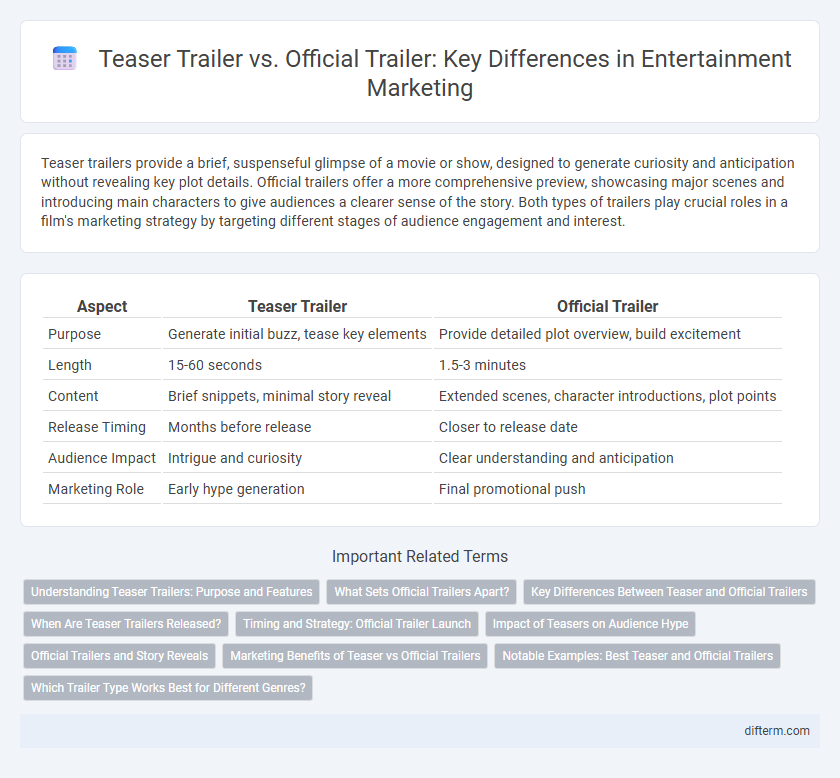Teaser trailers provide a brief, suspenseful glimpse of a movie or show, designed to generate curiosity and anticipation without revealing key plot details. Official trailers offer a more comprehensive preview, showcasing major scenes and introducing main characters to give audiences a clearer sense of the story. Both types of trailers play crucial roles in a film's marketing strategy by targeting different stages of audience engagement and interest.
Table of Comparison
| Aspect | Teaser Trailer | Official Trailer |
|---|---|---|
| Purpose | Generate initial buzz, tease key elements | Provide detailed plot overview, build excitement |
| Length | 15-60 seconds | 1.5-3 minutes |
| Content | Brief snippets, minimal story reveal | Extended scenes, character introductions, plot points |
| Release Timing | Months before release | Closer to release date |
| Audience Impact | Intrigue and curiosity | Clear understanding and anticipation |
| Marketing Role | Early hype generation | Final promotional push |
Understanding Teaser Trailers: Purpose and Features
Teaser trailers serve as concise previews designed to generate excitement and curiosity by revealing minimal plot details while emphasizing key visual elements or iconic characters. Their purpose is to create anticipation and buzz early in a film's marketing campaign without spoiling the storyline. Typically shorter than official trailers, teaser trailers prioritize mood and tone over narrative exposition, distinguishing them as essential tools for building initial audience interest.
What Sets Official Trailers Apart?
Official trailers distinguish themselves by offering a more comprehensive glimpse into the film's narrative, showcasing key plot points and main characters with polished cinematography and sound design. Unlike teaser trailers, which are brief and designed to build initial curiosity, official trailers provide detailed storytelling elements and emotional tones that aim to fully engage and inform audiences. The release timing of official trailers typically aligns closer to the movie premiere, maximizing promotional impact and audience anticipation.
Key Differences Between Teaser and Official Trailers
Teaser trailers are short, typically lasting 30 seconds to one minute, designed to generate initial interest through minimal plot details and striking visuals. Official trailers run longer, around two to three minutes, providing a more comprehensive overview with key plot points, character introductions, and tone setting. The primary difference lies in their purpose: teasers build anticipation with mystery, while official trailers aim to inform and attract a broader audience.
When Are Teaser Trailers Released?
Teaser trailers are typically released months in advance of the official trailer, aiming to generate early buzz and anticipation among fans. They often provide a brief glimpse of key scenes or characters without revealing significant plot details. Studios use teaser trailers as a strategic marketing tool to spark interest and build momentum well ahead of a film's premiere.
Timing and Strategy: Official Trailer Launch
Official trailer launches are strategically timed closer to the film or series release date to maximize audience anticipation and boost ticket sales. Unlike teaser trailers, which serve as early hype generators with minimal plot details, official trailers reveal more substantial story elements and key scenes to engage viewers fully. This timing ensures a crescendo in marketing momentum, aligning with promotional events and media coverage for optimal impact.
Impact of Teasers on Audience Hype
Teaser trailers serve as a strategic marketing tool designed to spark curiosity and build anticipation through brief, often enigmatic glimpses of a film or series, effectively generating viral buzz and social media chatter. Their limited duration and content create suspense that heightens audience engagement and encourages sharing, significantly amplifying pre-release hype. Studies reveal that well-crafted teasers can increase opening weekend ticket sales by up to 20%, demonstrating their critical role in shaping audience expectations and driving early interest.
Official Trailers and Story Reveals
Official trailers provide a comprehensive glimpse into a film's narrative, showcasing key plot points, character arcs, and major story reveals that tease the overall experience without spoiling critical twists. They often incorporate polished visuals, curated scenes, and impactful music to build anticipation and deepen the audience's connection to the story. Unlike teaser trailers, official trailers serve as the primary marketing tool to communicate the tone, genre, and emotional stakes of the entertainment project.
Marketing Benefits of Teaser vs Official Trailers
Teaser trailers generate early buzz and anticipation by offering a brief, mysterious glimpse of an upcoming film, effectively capturing audience interest without revealing key plot details. Official trailers provide a more comprehensive look, showcasing major scenes and story elements that strengthen audience engagement and boost ticket sales closer to the release date. The strategic use of teaser trailers maximizes social media sharing and viral marketing potential, while official trailers enhance conversion rates through detailed storytelling and clear calls to action.
Notable Examples: Best Teaser and Official Trailers
Teaser trailers, like the iconic "Inception" teaser, generate early buzz with brief, mysterious glimpses that intrigue audiences without revealing key plot points. Official trailers, such as the "Avengers: Endgame" trailer, provide a more comprehensive narrative overview, showcasing character arcs and pivotal moments to build anticipation. Both types of trailers play crucial roles in marketing, with teasers sparking curiosity and official trailers delivering excitement through detailed storytelling and high-impact visuals.
Which Trailer Type Works Best for Different Genres?
Teaser trailers work best for genres like horror and mystery by creating suspense with brief, enigmatic glimpses that intrigue audiences without revealing plot details. Official trailers suit action and adventure films, offering more comprehensive story elements and character insights to build excitement and anticipation. Comedy and family genres benefit from trailers blending humorous highlights with key narrative points, balancing teaser elements and fuller previews for wider appeal.
teaser trailer vs official trailer Infographic

 difterm.com
difterm.com